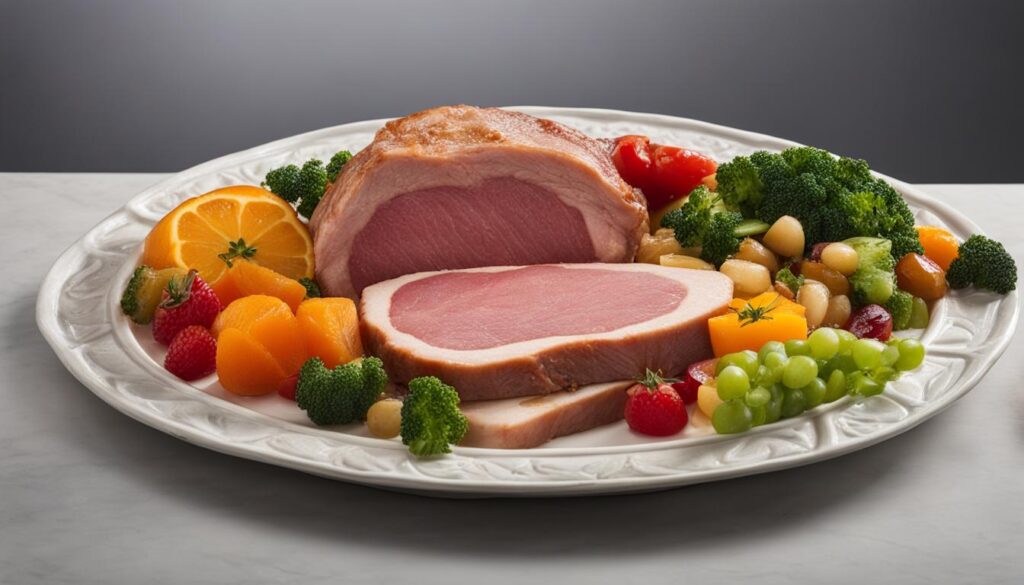When it comes to dietary preferences, religious beliefs and guidelines often play a significant role. For Protestants, the question of whether they can eat pork stems from the historical and cultural context of ancient Israelite culture. In this article, we will delve into the origins of dietary restrictions for Protestants and how they have evolved over time.
Key Takeaways:
- The dietary laws in ancient Israelite culture labeled certain animals, including pigs, as “unclean” and unfit for consumption.
- The New Testament brought about a shift in dietary practices for Christians, emphasizing the importance of the heart’s condition rather than outward observances.
- Protestants generally have individual liberty in matters of dietary choices, guided by personal convictions and love for others.
- Different Christian denominations may have varying interpretations and traditions when it comes to dietary restrictions.
- Religious beliefs and food practices intersect in various ways, including permanent and temporary food restrictions, food offerings, food charity, and special occasions.
Ancient Dietary Laws and Cultural Significance
In order to understand the question of whether Protestants can eat pork, it is important to delve into the ancient dietary laws and their cultural significance. These dietary laws were laid down in the books of Leviticus and Deuteronomy in ancient Israelite culture. According to these laws, certain animals, including pigs, were deemed “unclean” and unfit for consumption.
The prohibition against eating pork had multiple reasons. From a health perspective, pigs were more susceptible to parasites and diseases, especially in the hot climate of the Middle East. Additionally, pigs required more water and did not offer the same benefits as other livestock. However, the cultural significance of these dietary laws is also worth noting. They served to distinguish the Israelites from their neighbors and maintain a distinct identity.
The ancient Israelites saw pigs as contradictory creatures, which may have symbolized the importance of moral choices and genuine actions. By abstaining from pork consumption, the Israelites aimed to uphold their moral and ethical values. It is important to acknowledge that with the advent of Christianity, the significance of these dietary laws shifted. The teachings of Jesus and the actions of the apostles emphasized that purity is a matter of the heart rather than outward observances.
Dietary Rules of Protestantism: Shift in New Testament
When it comes to the religious beliefs and pork consumption, the New Testament brings about a significant shift in dietary rules for Protestants. The teachings of Jesus and the actions of the apostles challenged traditional views on food restrictions and emphasized the importance of the heart’s condition rather than outward observances. This shift in perspective indicates that spiritual purity is not necessarily tied to specific dietary practices.
In the New Testament, the apostle Peter’s vision played a pivotal role in reshaping the understanding of dietary restrictions. In his vision, Peter saw various animals, including those considered “unclean” according to Jewish traditions, being presented to him for consumption. This vision symbolized the inclusivity of the Gospel and highlighted the acceptance of Gentile believers without imposing Jewish customs.
Furthermore, the apostle Paul elaborated on the freedom in Christ, advising believers to act out of love and consideration for others. While all foods may be permissible, believers are encouraged to be sensitive to the consciences of fellow believers. The early Christian community addressed the issue of Gentile believers’ adherence to Jewish dietary laws in the Jerusalem Council, affirming their freedom from such requirements.
Different Christian Denominations and Their Views

When it comes to the question of whether Christians, including Protestants, can eat pork, there is variation depending on theological interpretations and historical contexts. Christianity has branched into various denominations, each with its own traditions and interpretations. The Roman Catholic Church, for example, emphasizes the teachings of the New Testament, which clarify that all foods are clean in the eyes of God. Protestantism generally champions individual liberty in matters of faith and practice, with dietary choices being guided by personal conviction.
However, it is important to note that there are variations within Protestantism itself. While most Protestant denominations have no prohibitions against pork, individual beliefs and convictions may vary. Some denominations may encourage a vegetarian or vegan lifestyle as a personal choice, while others may have no specific dietary restrictions at all. It ultimately depends on the individual’s interpretation of religious teachings and their commitment to following specific dietary guidelines.
The Eastern Orthodox Church
The Eastern Orthodox Church, another branch of Christianity, places emphasis on tradition in its dietary practices. During fasting periods, such as Lent, adherents are encouraged to abstain from certain foods, including meat, dairy, and sometimes even fish. However, these fasts do not specifically prohibit pork consumption.
Navigating Dietary Guidelines
For Protestants and other Christian believers, navigating dietary guidelines can be a personal journey. While some may choose to adhere strictly to biblical teachings and historical traditions, others may take a more flexible approach based on their understanding of grace and freedom in Christ. It is important to respect and understand the diversity of beliefs within the Christian community and approach discussions surrounding dietary restrictions with sensitivity and openness.
Religious Beliefs and Food Practices

The intersection of religion and food is a fascinating aspect of human culture. Religious dietary guidelines encompass a variety of practices and restrictions, influencing the food choices of believers. These guidelines can be categorized into different types, each serving a specific purpose within religious traditions.
Permanent Food Restrictions
Permanent food restrictions are rooted in religious beliefs and often reflect principles like non-violence or following divine commands. These restrictions can vary widely across different religions and may include the avoidance of certain meats, such as pork, or the exclusion of specific ingredients or food groups.
Temporary Food Restrictions
Temporary food restrictions, such as fasting, are a common practice in many religions. Fasting serves various purposes, including spiritual development, self-restraint, or atonement for sins. During fasting periods, believers may abstain from certain foods or refrain from eating altogether for a designated period of time.
Food Offerings, Charity, and Special Occasions
In religious traditions, food is often used as a means of expressing devotion and honoring deities or ancestors. Food offerings are made as a symbol of reverence and gratitude. Additionally, charity through food distribution is seen as an act of compassion and an expression of religious ideals. Furthermore, special religious occasions are often marked by the preparation and consumption of specific food dishes that hold deep religious significance.
Overall, the intersection of religion and food is a complex and multifaceted topic. Religious dietary guidelines play a significant role in shaping food practices and reflect the beliefs and traditions of various religious communities.
Conclusion
The question of whether Protestants can eat pork is a complex one that involves understanding the historical and cultural context of dietary laws in ancient Israelite culture. These dietary laws, which prohibited the consumption of certain animals like pigs, served to set the Israelites apart and maintain a distinct identity. However, with the teachings of Jesus and the decisions made by the early Christian community, there was a shift in dietary practices. Christians, including Protestants, generally have individual liberty in matters of dietary choices, guided by personal convictions and love for others.
Religious dietary guidelines play a significant role in shaping food practices in different religions. Permanent food restrictions, temporary fasting, food offerings, charity, and special food for religious occasions all reflect the intersection of religion and food. Religious individuals engage with their food choices based on informed and critical understanding, aligning their eating practices with their religious beliefs and global responsibilities.
When it comes to the question of whether Protestants can eat pork, different Christian denominations have varying views influenced by their theological interpretations and historical contexts. While the Roman Catholic Church emphasizes the teachings of the New Testament and considers all foods clean, Protestantism generally champions individual liberty in matters of faith and practice. It’s important to note that there may still be variations within Protestantism, with individual beliefs and convictions playing a role in dietary choices.
In conclusion, the question of dietary restrictions for Protestants and religious dietary guidelines is a nuanced one. Understanding the historical context, teachings of Jesus, and individual convictions are important factors in determining food practices within the Protestant Christian community and other religions. By embracing informed and critical engagement with food, individuals can align their eating practices with their religious values and embody a sense of responsibility towards themselves and the world around them.
FAQ
Why were pigs considered unclean in ancient Israelite culture?
Pigs were considered unclean in ancient Israelite culture due to various reasons, including health and sanitation concerns, symbolic interpretations, and the desire for separation from other tribes and cultures.
Did Jesus and the apostles change the dietary laws for Christians?
Yes, the teachings of Jesus and the actions of the apostles brought about a shift in dietary practices for Christians, emphasizing that purity is a matter of the heart rather than outward observances.
Can Protestants eat pork?
Generally, Protestants have individual liberty in matters of dietary choices, including the consumption of pork. However, individual beliefs and convictions may vary within different Protestant denominations.
Do all Christian denominations allow the consumption of pork?
Different Christian denominations have varied views on dietary restrictions. While most do not have prohibitions against eating pork, there may be variations within each denomination.
How does religion influence food choices?
Religion influences food choices through permanent and temporary food restrictions, food offerings to deities or ancestors, food charity to help the poor, and the consumption of special food dishes for religious occasions.
What is the role of food in religion?
The role of food in religion is significant, as it intersects with religious beliefs, traditions, and practices. It allows religious individuals to align their eating practices with their religious beliefs and global responsibilities.

